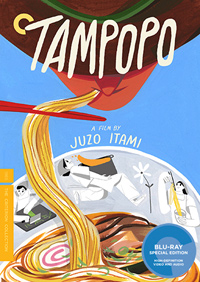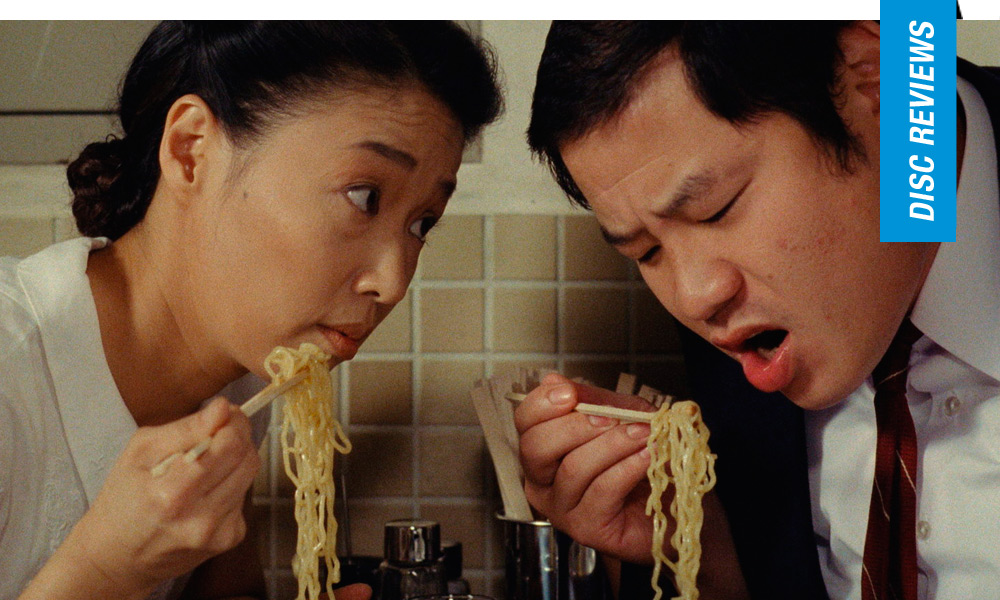Disc Reviews
Criterion Collection: Tampopo | Blu-ray Review
 Perhaps the first and most apt film deserving of the categorization known as ‘food porn,’ Juzo Itami’s hit sophomore film Tampopo receives a lush restoration courtesy of the Criterion Collection. The comedically inclined series of vignettes, revolving around the struggle of the titular noodle shop owner and her quest to make the perfect ramen, this offbeat aperitif is a zany mish-mash of tones and goofy characterizations.
Perhaps the first and most apt film deserving of the categorization known as ‘food porn,’ Juzo Itami’s hit sophomore film Tampopo receives a lush restoration courtesy of the Criterion Collection. The comedically inclined series of vignettes, revolving around the struggle of the titular noodle shop owner and her quest to make the perfect ramen, this offbeat aperitif is a zany mish-mash of tones and goofy characterizations.
More odd than hysterical, the film is an excellent introduction to Itami, who worked exclusively as an actor until he turned to directing at the age of fifty in 1984 with The Funeral. Janus re-released the film theatrically in October, 2016 in a limited four theater capacity.
Warmly received by US critics when it was released stateside in 1987 (it snagged an Indie Spirit Award for Best Foreign Film), this sincerely enjoyable venture is perhaps the most glorious homage to the artistic process of noodles ever made, and has been comically referred to as a ‘Ramen Western’ for its tonal relationship to genre. Though there’s a gentle romance nestled among juxtaposed vignettes exploring people’s various obsessions with food, there’s no passion greater than the centrifugal desire to not only create the perfect ramen establishment, but a desire to properly appreciate and honor its consumption with ceremonious respect. Although this sounds much more serious when described, Itami’s film is indefatigably sweet-hearted and whatever your level of entertainment derived from this effervescent time capsule, you’re bound to leave with a pleasant glow.
Truck driver Goro (Tsutomu Yamazaki) and his younger colleague Gun (Ken Watanabe) stop for a bite to eat at a rundown ramen noodle shop run by widowed mother, Tampopo (Nobuko Miyamoto). They witness her son Tabo arrive, fresh from a daily dose of bullying at school, which invites the derisive harassment of a customer, Pisken (Rikiya Yasuoka), who demands ownership of the vulnerable woman and her son. Appalled at this behavior, Goro challenges Pisken to a fight, but gets beaten up since he’s outnumbered. The next day he wakes up in Tampopo’s home, where she prepares her noodles for the Goro and Gun and asks their honest opinion—they agree her cooking isn’t terrible but could use some work. She begs Goro to become her mentor, and he agrees to help Tampopo transform her skills so she can achieve her dream of opening a renowned noodle shop.
Itami’s Tampopo plays like the affectionate counter to the austere Babette’s Feast, which took home a Best Foreign Language in 1988 and hinges on the universal appeal of shared succulent meals which transcend cultural mores and attitudes. Undoubtedly, Tampopo is a Japanese film (as much as say, something like Haute Cuisine is inescapably French or Eat Drink Man Woman is Taiwanese), but is all the more charming and entertaining for its distinctiveness. With ramen popularized heavily in Western cuisine, the film is a reminder of the mainstay’s traditional roots.
Although Itami juxtaposes several vignettes throughout the film (including its opening sequence in a movie house which plays like a reversal on Allen’s The Purple Rose of Cairo), the prominent storyline belongs to the titular woman (whose name means Dandelion) who so desires to perfect her art and run a successful ramen joint. As played by Nobuko Miyamoto, wife of Juzo Itami, Tampopo is a well-meaning, tender soul, who falls under Tsutomu Yamazaki’s patient tutelage. As Goro, the actor is sort of like those old cowboys who swagger through a dusty Old West town in trouble, staying behind long enough to get everything up and running properly (as his younger sidekick, the film features Ken Watanabe in one of his first roles).
A quiet sort of attraction seems to grow between the two, which makes their final goodbye, a meaningful but extended glance, all the more touching. Not all of these subplots are quite as innocent, however, and Itami presents a cavalcade of more aggressive aficionados of food, like a gangster and his moll who let live creatures thrash on their flesh during foreplay, or another moment where citrus is squeezed erratically over a lover’s breasts. Other strands are undoubtedly included for insane comedy, like a sick mother who is roused out of bed by her husband to prepare a meal, presumably because he thinks this will revive her. When she dies shortly after serving it, he screams at the children to finish eating before it gets cold, “It’s the last meal your mother cooked.”
If Tampopo is all about a woman defying the odds to become a celebrated noodle shop owner and overcoming her limitations as a creator of solid dishes which ‘lack pizzazz,’ Itami’s film has the exact opposite flavor—a film about love, desire, and humankind’s inescapable passion for food. Itami’s tragic demise twelve years later (he committed suicide after a tabloid published evidence of an extra-marital affair, while other rumors claim other explanations for what motivated the incident) tends to cast a melancholy pallor over his films, and it’s a reality creating a particularly pronounced juxtaposition here. As Masaki Tamura’s (Lady Snowblood; Eureka) camera rests on Miyamoto’s open, smiling expression, we are left with a graceful moment celebrating the zesty possibilities of life, while Yamazaki drifts off in his truck and the credit reel of a breastfeeding woman begins.
Disc Review:
Criterion presents Tampopo with a new 4K digital restoration in its original aspect ratio of 1.85:1. Itami’s longtime cinematographer Yonezo Maeda approved of this transfer, which was scanned from the original 35 mm negative. Picture and sound quality, including a monaural soundtrack, are fantastic in this remastering. On the more effervescent side of Criterion’s selections, some unique and intriguing extra features are also included to supplement the film’s edible aura.
The Making of Tampopo:
This behind-the-scenes ninety minute documentary filmed in 1985 is narrated by Juzo Itami and was shot during Tampopo‘s production.
Nobuko Miyamoto:
Actor Nobuko Miyamoto discusses playing the title role in Tampopo and her experiences working with husband Juzo Itami in this eleven minute interview recorded by Criterion in 2016. Miyamoto stresses Itami aimed for three things in al his films—that they would be surprising, fun, and could by understood by anyone.
Seiko Ogawa:
Food stylist Seiko Ogawa discusses working on Tampopo in this fifteen minute interview recorded by Criterion in 2016.
The Amateur and the Craftsperson:
Filmmakers Tony Zhou and Taylor Ramos crafted this ten minute video essay in 2017 which examines themes of self-improvement and the mastery of craft in Tampopo.
The Perfect Bowl:
Criterion produced this 2016 twenty-two minute program on Tampopo‘s influence on food culture in Japan, featuring interviews with ramen expert Hiroshi Oosaki, and ramen chefs Ivan Orkin, Jerry Jaksich, Sam White, and Rayneil De Guzman.
Rubber Band Pistol:
Criterion includes Juzo Itami’s first short, the thirty-two minute “Rubber Band Pistol” (1962), which played at the London Film Festival.
Final Thoughts:
A perfect night of entertainment would consist of a cozy ramen restaurant after a theatrical viewing of the delectable food preparation on display in Tampopo—or the next best option, which is this lavish restoration.
Film Review: ★★★½/☆☆☆☆☆
Disc Review: ★★★★/☆☆☆☆☆



































